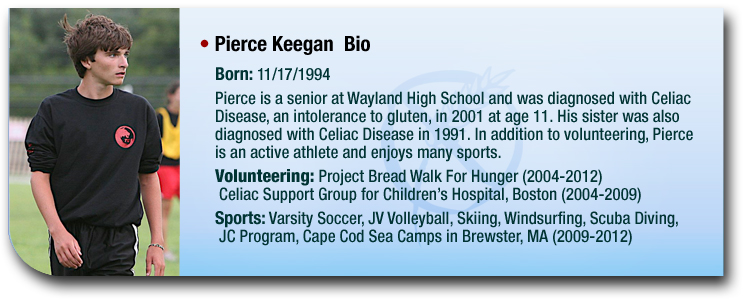
Contact us to setup a local branch in your area: info@piercespantry.com

A Letter from Pierce:
I wanted to share with you why I decided to create a gluten-free food bank. It started a few years ago while participating in the Project Bread Walk for Hunger, a 20-mile fundraising event. I started to think about where someone like myself, a celiac, who had intolerance to gluten, a protein found in wheat, rye, oats & barley, would be able to get gluten-free food if they were in need. I’d been raising money for Project Bread for many years without considering the fact that I and other gluten insensitive people would have trouble finding safe food in any of the hundreds of food pantries across the state. Recent studies out of the University of Maryland Celiac Center conclude that gluten intolerance now affects over 7% of the national population.
Unfortunately, according to the 2011 Project Bread Status Report on Hunger over 700,000 people in Massachusetts are struggling to put food on the table. This number is 10.8% of the population and the number continues to climb. Furthermore, “With food insecurity rates projected to hit unprecedented levels in Massachusetts, families who have long considered themselves middle class are suddenly unable to purchase enough food.”
I decided to visit a food pantry to see what gluten- free foods were available and there were few if any safe options. I thought about how hunger could force an unsafe decision on the part of someone who has gluten- intolerance or a parent of a child with celiac disease who would rather feed their child unsafe food rather than watch them go hungry even if it will make them more ill in the long run. To make matters worse, the gluten-free diet is very expensive. A study published in the Canadian Journal of Dietetic Practice and Research determined that the average unit cost of a GF product is $1.71 versus $.61 for gluten containing products. This is over 200% more than “regular” food. As difficult as it may be to support a family in these harsh economic times, the need for a gluten-free diet can add an insurmountable burden to the family budget.
I spoke with my family about starting a gluten-free food bank to help provide safe food for people with celiac disease or other forms of gluten intolerance. My mission is to make gluten-free emergency food available through participating food pantries. I have been working hard to get sponsors to donate gluten free food and contacting area food pantries to let them know that a new resource for gluten-free food is available for clients who require a gluten-free diet.
Together we can make a difference!
